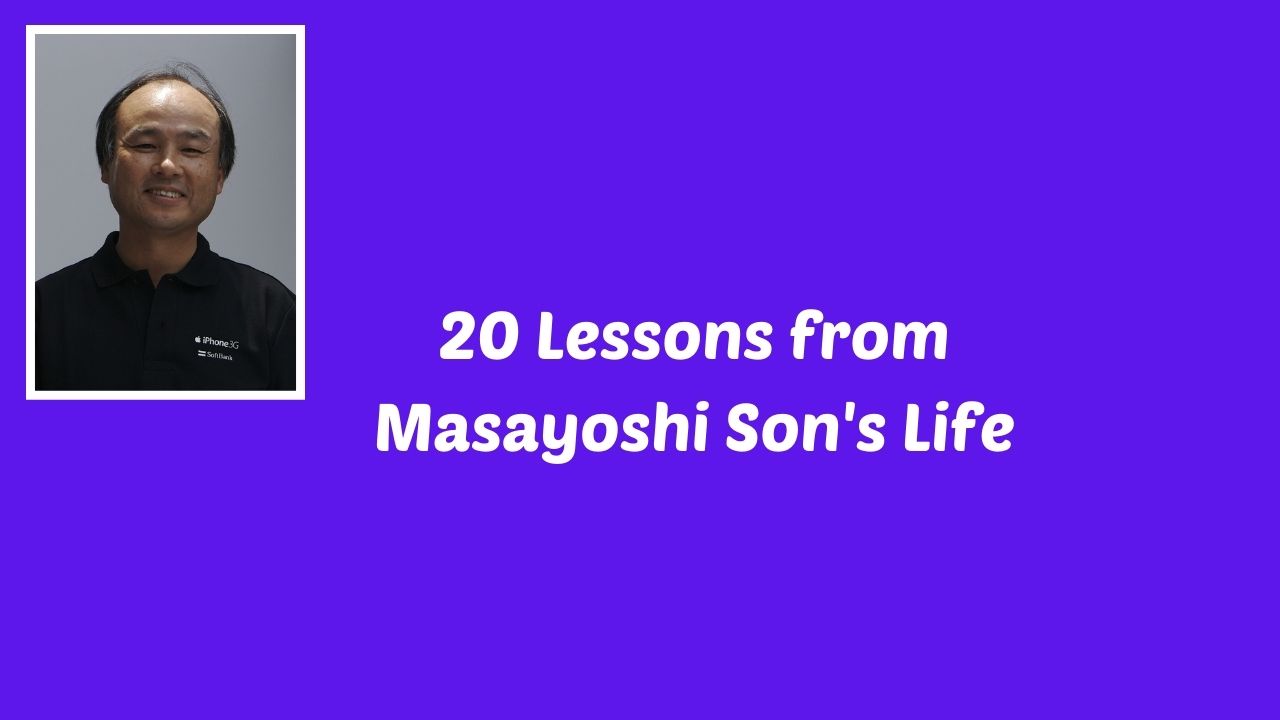
Lessons from Masayoshi Son’s Life#
Masayoshi Son (born 1957) is CEO and founder of SoftBank, a Japanese multinational conglomerate. His father and other Koreans illegally built their houses on land that was owned by Japan National Railways, which caused them trouble with the authorities. His father raised pigs and chickens on that land, and started an illegal sake business that eventually became successful enough for his family to become the first people in town to own a car. His family eventually moved out of the neighborhood so that Son could attend a better school
His life’s journey from a modest upbringing to becoming a tech magnate offers numerous insights into entrepreneurship and leadership. Here are 20 lessons drawn from his life. These lessons from Masayoshi Son’s life illustrate the importance of resilience, innovation, and strategic vision in achieving entrepreneurial success.
20 Lessons from Masayoshi Son’s Life#
Embrace Your Heritage: Despite societal pressures, Son chose to honor his Korean roots, serving as a role model for ethnic Korean children in Japan.
Seek Mentorship: Early in his career, Son sought guidance from Den Fujita, president of McDonald’s Japan, who advised him to study English and computer science.
Pursue Education Abroad: He moved to the U.S. at 16 to study, broadening his perspectives and understanding of global markets.
Identify Emerging Trends: At 19, Son recognized the potential of computer technology, leading him to focus on the burgeoning tech industry.
Start Early: While still a student, he created an electronic translator, which he sold to Sharp Corporation for $1.7 million.
Diversify Ventures: Son’s ventures ranged from software distribution to telecommunications, showcasing his ability to adapt and diversify.
Take Calculated Risks: His $20 million investment in Alibaba in 2000 grew to a valuation of around $75 billion by 2014, exemplifying the rewards of calculated risks.
Learn from Failures: Son experienced significant losses during the dot-com crash but used these experiences to refine his investment strategies. Before the crash he was Richest person in the world for short period.
Innovate Continuously: He transformed SoftBank from a software vendor into a major telecommunications operator and later into an investment holding company.
Maintain Resilience: Despite losing more than $59 billion during the dot-com crash, Son remained determined and continued to pursue new ventures.
Value Long-Term Vision: His investments in companies like Yahoo! and Alibaba were based on long-term potential rather than immediate returns.
Adapt to Market Changes: Son’s ability to pivot SoftBank’s focus in response to market trends has been key to the company’s sustained success.
Invest in Innovation: He has consistently invested in innovative technologies and companies, keeping SoftBank at the forefront of technological advancements.
Build Strategic Partnerships: Collaborations with companies like Yahoo! and Vodafone have been instrumental in SoftBank’s growth.
Commit to Philanthropy: Son’s charitable efforts, including significant donations following natural disasters, highlight the importance of giving back to society.
Stay Ahead of Trends: His focus on artificial intelligence and other emerging technologies demonstrates the importance of staying ahead of industry trends.
Leverage Global Opportunities: Son’s international investments and operations underscore the benefits of a global business perspective.
Balance Boldness with Prudence: While known for bold investments, Son also emphasizes the need for careful planning and risk assessment.
Lead with Vision: His leadership at SoftBank is characterized by a clear vision for the future, inspiring innovation and growth.
Embrace Lifelong Learning: Son’s continuous pursuit of knowledge and adaptation to new technologies highlight the importance of lifelong learning in achieving sustained success.


Comments: